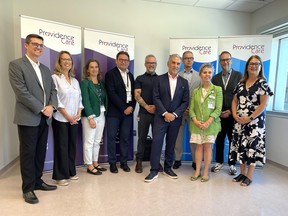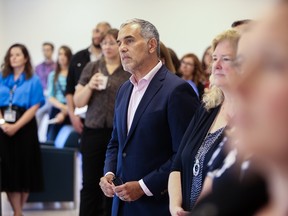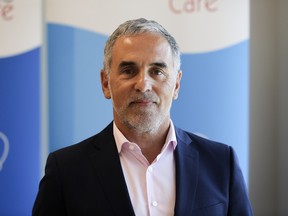Breadcrumb Trail Links
NewsLocal News
Centre to be a national hub for clinical trials, research
Published Aug 11, 2024 ┬атАв┬а 9 minute read
 Representatives from Queen’s University, Providence Care, the Ontario Brain Institute and others gathered to mark the official opening of the Centre for Psychedelics Health and Research at Providence Care Hospital in Kingston on Wednesday, Aug. 7, 2024. Photo by Meghan Balogh /The Whig-StandardArticle content
Representatives from Queen’s University, Providence Care, the Ontario Brain Institute and others gathered to mark the official opening of the Centre for Psychedelics Health and Research at Providence Care Hospital in Kingston on Wednesday, Aug. 7, 2024. Photo by Meghan Balogh /The Whig-StandardArticle content
KingstonтАЩs Providence Care and QueenтАЩs University have partnered to open CanadaтАЩs first centre dedicated to health research and training in psychedelic compounds.
Advertisement 2
This advertisement has not loaded yet, but your article continues below.
THIS CONTENT IS RESERVED FOR SUBSCRIBERS
Subscribe now to read the latest news in your community.
Unlimited online access to all articles on thewhig.com.Access to subscriber-only content, including History: As We Saw It, a weekly newsletter that rips history from our archives, which span almost 190 years.Enjoy insights and behind-the-scenes analysis from our award-winning journalists.Support local journalism and the next generation of journalists.
SUBSCRIBE TO UNLOCK MORE ARTICLES
Subscribe now to read the latest news in your community.
Unlimited online access to all articles on thewhig.com.Access to subscriber-only content, including History: As We Saw It, a weekly newsletter that rips history from our archives, which span almost 190 years.Enjoy insights and behind-the-scenes analysis from our award-winning journalists.Support local journalism and the next generation of journalists.
REGISTER / SIGN IN TO UNLOCK MORE ARTICLES
Create an account or sign in to keep reading.
Access more articles from thewhig.com.Share your thoughts and join the conversation in the comments.Get email updates from your favourite journalists.Sign In or Create an Account
or
Article content
Organizers gathered on Wednesday to mark the grand opening of the Centre for Psychedelics Health and Research at Providence Care Hospital, which they hope will become a hub for not only psychedelic research in the country, but also a national platform for clinical trials to explore the safety and efficacy of psychedelic compounds, a chance to train medical professionals in the current and future use of these substances and a way for policymakers, community members and researchers to share knowledge.
The centre opens thanks to a donation from the Ontario Brain Institute (OBI), and in partnership with the Canadian Biomarker Integration Network in Depression.
The centre was born out of work being done by the Psychedelic Science Advisory Committee at QueenтАЩs University, formed in 2021 and led by committee chair Claudio Soares, a professor in the department of psychiatry in the QueenтАЩs University School of Medicine and the new centreтАЩs director.
Advertisement 3
This advertisement has not loaded yet, but your article continues below.
Article content
That committee, in conjunction with other researchers in Canada and around the world, has already begun contributing to the scientific body of knowledge via clinical trials in Kingston, specially looking at applications for the compound psilocybin, found in species of mushrooms around the world.
 Claudio Soares, a professor of psychiatry at QueenтАЩs University and the director of the new Centre for Psychedelics Health and Research at Providence Care Hospital, listens to presenters during the centreтАЩs grand opening on Wednesday, Aug. 7, 2024. Photo by Meghan Balogh /The Whig-Standard
Claudio Soares, a professor of psychiatry at QueenтАЩs University and the director of the new Centre for Psychedelics Health and Research at Providence Care Hospital, listens to presenters during the centreтАЩs grand opening on Wednesday, Aug. 7, 2024. Photo by Meghan Balogh /The Whig-Standard
The centre will also have the opportunity to look at other psychotropic substances such as 3,4-Methylenedioxymethamphetamine (MDMA), lysergic acid diethylamide (LSD) and ketamine and the effects that a growing body of research is demonstrating these compounds can have on various disorders such as depression, post-traumatic stress disorder (PTSD), addiction and end-of-life distress.
Cathy Szabo, president and chief executive officer for Providence Care, described the centreтАЩs opening as a тАЬpivotal moment for the advancement of health care, innovation and collaboration in the Kingston community and beyond.тАЭ
The Kingston Whig-Standard’s Noon News Roundup
Thanks for signing up!
Article content
Advertisement 4
This advertisement has not loaded yet, but your article continues below.
Article content
тАЬToday marks the beginning of an exciting new chapter for our research department at Providence Care,тАЭ Szabo said on Wednesday. тАЬAnd we are incredibly proud to welcome this innovative centre, which represents our continued commitment to excellence in health care.тАЭ
Szabo described psychedelic research as a new frontier in mental health treatment and research.
тАЬThe centre promises to open horizons for new future partnerships in health care, psychiatry and beyond,тАЭ she said. тАЬI take pride that we gather here today to celebrate this exciting moment.тАЭ
Dr. Jane Philpott is a former federal health minister and the dean of QueenтАЩs Health Sciences and spoke during the opening of the centre.
тАЬCongratulations to everyone in this room who has had a part in making this possible,тАЭ she said on Wednesday. тАЬItтАЩs a day that I think several of us having been dreaming of for years, that a physical space would emerge.тАЭ
Advertisement 5
This advertisement has not loaded yet, but your article continues below.
Article content
Philpott said that the day was about the many people who made the centre a reality, but also about the тАЬenormous possibilities as to what could happen with this group of substances, which have previously not had the opportunity to be researched adequately.тАЭ
тАЬMany people believe that there is enormous therapeutic potential that is yet untapped, (but there is) actually not the kind of evidence base necessary in order to be able to do the regulatory work that will be required to be able to make these substances available, and to understand how they can best maximize their potential and minimize their harm,тАЭ she said. тАЬItтАЩs very exciting to see that this has come together.тАЭ
History of psychedelic research in North America
Advertisement 6
This advertisement has not loaded yet, but your article continues below.
Article content
Albert Garcia-Romeu, an associate professor of psychiatry and behavioural sciences at the Johns Hopkins University School of Medicine, and the associate director at the Johns Hopkins Center for Psychedelic & Consciousness Research, spoke via video link during the centreтАЩs opening event.
Garcia-Romeu said that the opening of centres like his and the one at Providence Care Hospital mark a significant change in the way that medicine and psychiatry view psychedelic substances, which were formerly seen primarily as dangerous, without medical potential.
тАЬMay of (these substances) have been used for centuries, or even thousands of years, going back to Indigenous cultures who used psilocybin-containing mushrooms,тАЭ he said, pointing to Guatemala and Mexico, and historical records reaching back to the 1500s from European scholars who found that the Aztec people called these mushrooms divine substances of religious importance.
Advertisement 7
This advertisement has not loaded yet, but your article continues below.
Article content
тАЬThese are not necessarily anything new to us,тАЭ he said. тАЬHowever, western science didnтАЩt know anything about these substances until the 20th century.тАЭ
From the time that Swiss chemist Dr. Albert Hoffman first synthesized LSD in the 1930s, discovering its psychoactive properties, interest in psychedelic compounds began to grow.
тАЬFrom the 1940s to the 1970s there was a significant body of work that was happening, not just in North America, but also in Europe and AsiaтАЭ Garcia-Romeu said. тАЬSome of the most important and pioneering work was actually happening in Canada in Saskatchewan by Dr. Humphry Osmond, who was actually the person who coined the term тАШpsychedelicтАЩтАж specifically to try to characterize what these drugs were doing in their work with patients with alcoholism.
Advertisement 8
This advertisement has not loaded yet, but your article continues below.
Article content
тАЬThey were consistently getting reports of highly meaningful and even sometimes, what may be reported as spiritual types of experiences, that help these folks to move into a recovery from some of these very difficult to treat substance use issues.тАЭ
Garcia-Romeu described the past two decades as a тАЬpsychedelic Renaissance,тАЭ with small studies showing тАЬsignificant promising findingsтАЭ in treating depression, addictions, end-of-life anxiety and PTSD, and studies now growing to become phase III clinical trials.
тАЬToday, with the current opioid crisis and the other mental health crises that we face, weтАЩre heavily in need of new and novel types of treatment interventions,тАЭ he said. тАЬAnd I think psychedelics really represent one of our leading new discoveries to try to help us move that in the right direction.тАЭ
Advertisement 9
This advertisement has not loaded yet, but your article continues below.
Article content
The growing interest in psychedelics as medicine
Providence Care and QueenтАЩs UniversityтАЩs research centre joins a growing roster of centres worldwide, many in the United States. ItтАЩs the first of its kind in Canada.
While psychedelic compounds like psilocybin, MDMA, ketamine and LSD are illegal and regulated in Canada under the Controlled Drugs and Substances Act (CDSA), Health Canada makes access to these and other substances available through very specific pathways, including for clinical trials and through its Special Access Program, which allows medical professionals to help patients in certain medical circumstances gain permission for possession and use.
Accessing these substances for clinical trials, navigating the ethics of their trial use and creating a research environment in Kingston has involved тАЬquite a lot of logistics,тАЭ Soares told the Whig-Standard during a recent interview.
Advertisement 10
This advertisement has not loaded yet, but your article continues below.
Article content
 Claudio Soares is a professor of psychiatry at QueenтАЩs University and the director of the new Centre for Psychedelics Health and Research at Providence Care Hospital. Photo by Meghan Balogh /The Whig-Standard
Claudio Soares is a professor of psychiatry at QueenтАЩs University and the director of the new Centre for Psychedelics Health and Research at Providence Care Hospital. Photo by Meghan Balogh /The Whig-Standard
One of the first psilocybin trials at QueenтАЩs University, examining psilocybinтАЩs effects on people suffering from alcohol use disorder, is just now wrapping up, and Soares is excited by results that he said are тАЬquite striking,тАЭ with some participants going from 15 to 20 drinks per day, down to one per week.
The randomized study, one part of a larger study taking place across Canada and Europe, utilized motivational enhancement therapy alongside an experience with psilocybin to help people reduce their cravings to alcohol.
The official results of the study will come later this year, Soares said, and four more psychedelic trials are waiting in the wings for QueenтАЩs researchers, including one examining the microdosing of these compounds.
Advertisement 11
This advertisement has not loaded yet, but your article continues below.
Article content
Soares is one of three individuals trained in the application of psychedelic-assisted psychotherapy who will be working out of the new centre.
He recently completed the psychedelic-assistant therapies and research certificate program through the California Institute of Integral Studies, a 10-month training program in the U.S. to help medical professionals navigate the skills and knowledge needed to work with psychedelics.
тАЬIt gave me a broader view of psychedelic research and clinical practice,тАЭ he said.
It was his examination of the work of other centres in the U.S. that helped Soares develop the centre in Kingston.
тАЬThe director of the Johns Hopkins centre is part of our council,тАЭ Soares said. тАЬTheyтАЩve been doing research for 20 years.тАЭ
Advertisement 12
This advertisement has not loaded yet, but your article continues below.
Article content
Psychedelics in the mainstream
Soares is interested in how these compounds have manifested throughout human history, but more recently have worked their way from underground use to more mainstream knowledge.
тАЬThere is a lot to be learned from the longstanding recreational or underground use, and the more we can actually help people to share their knowledge, then that knowledge can actually (help to) form the next steps for therapeutic use.тАЭ
Navigating the cultural, religious and social implications of some psychedelic compounds can complicate scientific exploration, Soares said.
With ritual, community support and cultural importance, some psychedelic compoundsтАФsuch as peyote for Indigenous North Americans, or Ayahuasca in SoaresтАЩ native South AmericaтАФmay not translate to the medical world. And thatтАЩs OK, Soares said.
Advertisement 13
This advertisement has not loaded yet, but your article continues below.
Article content
тАЬItтАЩs very difficult to just say I can use the same molecule or the same medicine in the mainstream and that can be easily adapted,тАЭ he said. тАЬSo, there are probably some of the psychedelics that will never be able to fully be used the way that they are used on the ground, and maybe they shouldnтАЩt, right?тАЭ
тАШItтАЩs evolving very quicklyтАЩ
With a research background in depression, and his ongoing work with cancer patients, psychedelics piqued his interest as an тАЬalternative treatment for patients who donтАЩt respond to the treatments that we have.тАЭ
тАЬThe patients that donтАЩt respond well, particularly with severe PTSD, and the existential distress in patients with end-of-life or late-stage cancer, these are very difficult to manage situations, and these are some of the areas that psychedelics are emerging as very promising,тАЭ he said. тАЬThey are not a panaceaтАжbut they should be considered as hopefully reliable and well-characterized treatments for those patients who are likely to respond. We just have to exactly find out which ones are.тАЭ
Advertisement 14
This advertisement has not loaded yet, but your article continues below.
Article content
Soares believes that hospitals and universities are тАЬputting themselves out thereтАЭ with psychedelics, after having been left behind during the legalization of cannabis.
тАЬWhen that was happening, I would say most medical centres remained on the sidelines,тАЭ he said. тАЬThey didnтАЩt necessarily incorporate cannabis into their medical practice, and didnтАЩt teach it in medical schools. And they were caught off guard when cannabis became legalized, and there was very little knowledge or research going on.тАЭ
The proactive approach is allowing QueenтАЩs University and Providence Care to produce knowledge that will guide the future of psychedelics in Canada.
тАЬItтАЩs evolving very quickly,тАЭ Soares said, pointing to the growing body of research emerging from all over the world.
Advertisement 15
This advertisement has not loaded yet, but your article continues below.
Article content
тАЬI think itтАЩs kind of an eye-opener to Canadian institutions. LetтАЩs be on the science-producing side, as opposed to just consumers.тАЭ
Soares is hopeful that the new centre at Providence Care Hospital will become a hub for clinical trials in Canada, connecting interested universities and research centres across the country.
тАЬOur hope is that we can help to build and lead those clinical trials in Canada.тАЭ
Locally, Soares hopes the centre will form many partnerships to integrate multiple health-care professions.
тАЬWe are trying to build capacity, for instance, to explore psychedelics and and mental health in the military and veterans,тАЭ he said. тАЬThere are some emerging partnerships that we are building, and then obviously the partnership with QueenтАЩs. (We hope to) have a opportunity for training of nurses, medical students, residents to learn about psychedelics as well.тАЭ
Advertisement 16
This advertisement has not loaded yet, but your article continues below.
Article content
Soares told those assembled on Wednesday that he is тАЬhumbled for us to have the opportunity to join the larger community of researchers in psychedelics,тАЭ a field in which he said a lot of interesting research is happening.
тАЬWeтАЩre really excited,тАЭ Soares said. тАЬOne thing that will be very different at this centre from all the other centres that I know is the opportunity to do multi-professional, multidisciplinary research. A lot of research that is happening is really focused on mental health, and primarily with neuroscientists. Here, we really have the opportunity to branch out to rehab, to palliative medicine, to nursing, to psychology and to expand the research in psychedelics.тАЭ
Most importantly, Soares told those gathered, are the potential ways that psychedelics can impact patients.
тАЬThey have so many unmet needs, and I think psychedelics will be another tool in their toolbox.тАЭ
Article content
Share this article in your social network
Source link : http://www.bing.com/news/apiclick.aspx?ref=FexRss&aid=&tid=66b961b76f9145609fb3c7ff27747823&url=https%3A%2F%2Fwww.thewhig.com%2Fnews%2Fcanadas-first-multidisciplinary-psychedelic-research-centre-opens-in-kingston&c=10549191819987738654&mkt=en-us
Author :
Publish date : 2024-08-11 13:53:00
Copyright for syndicated content belongs to the linked Source.









